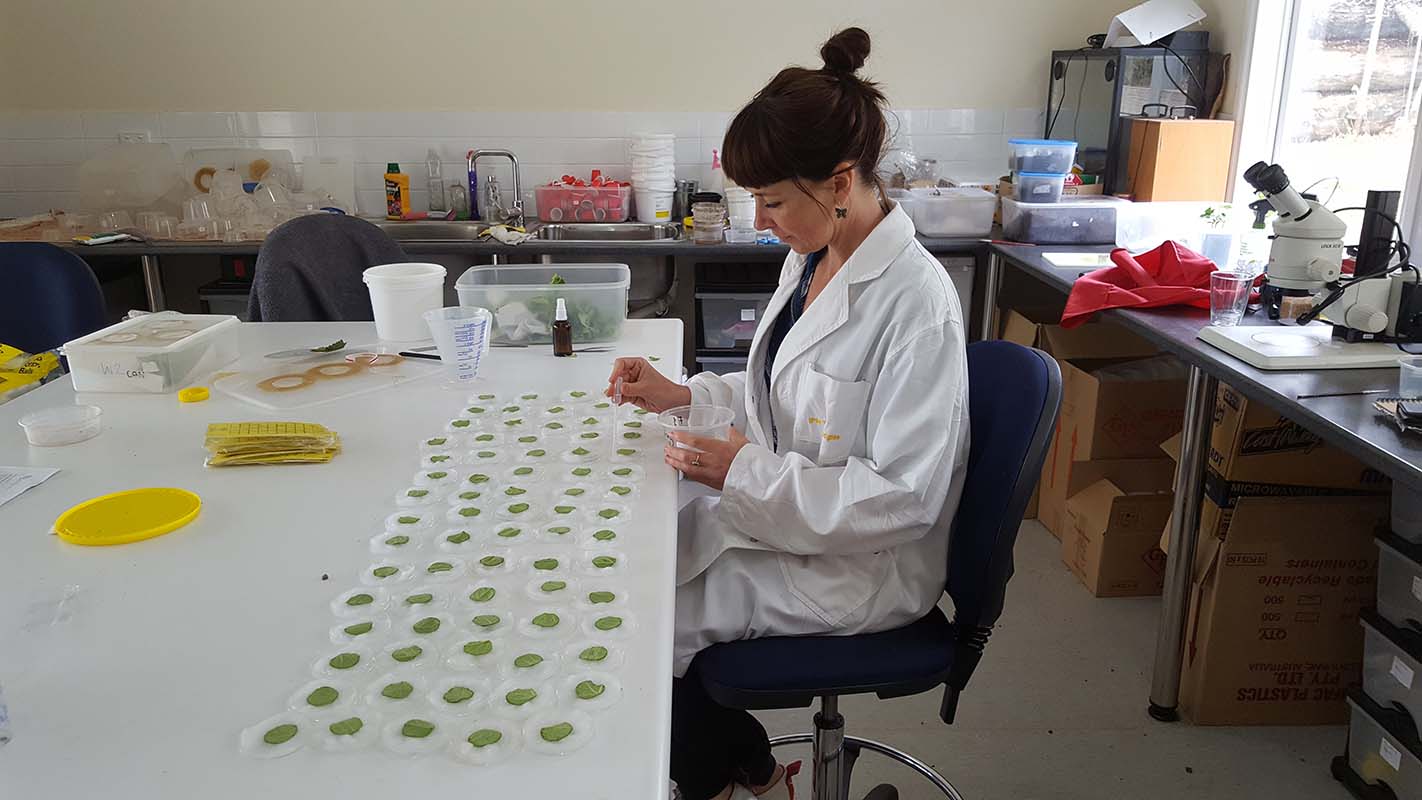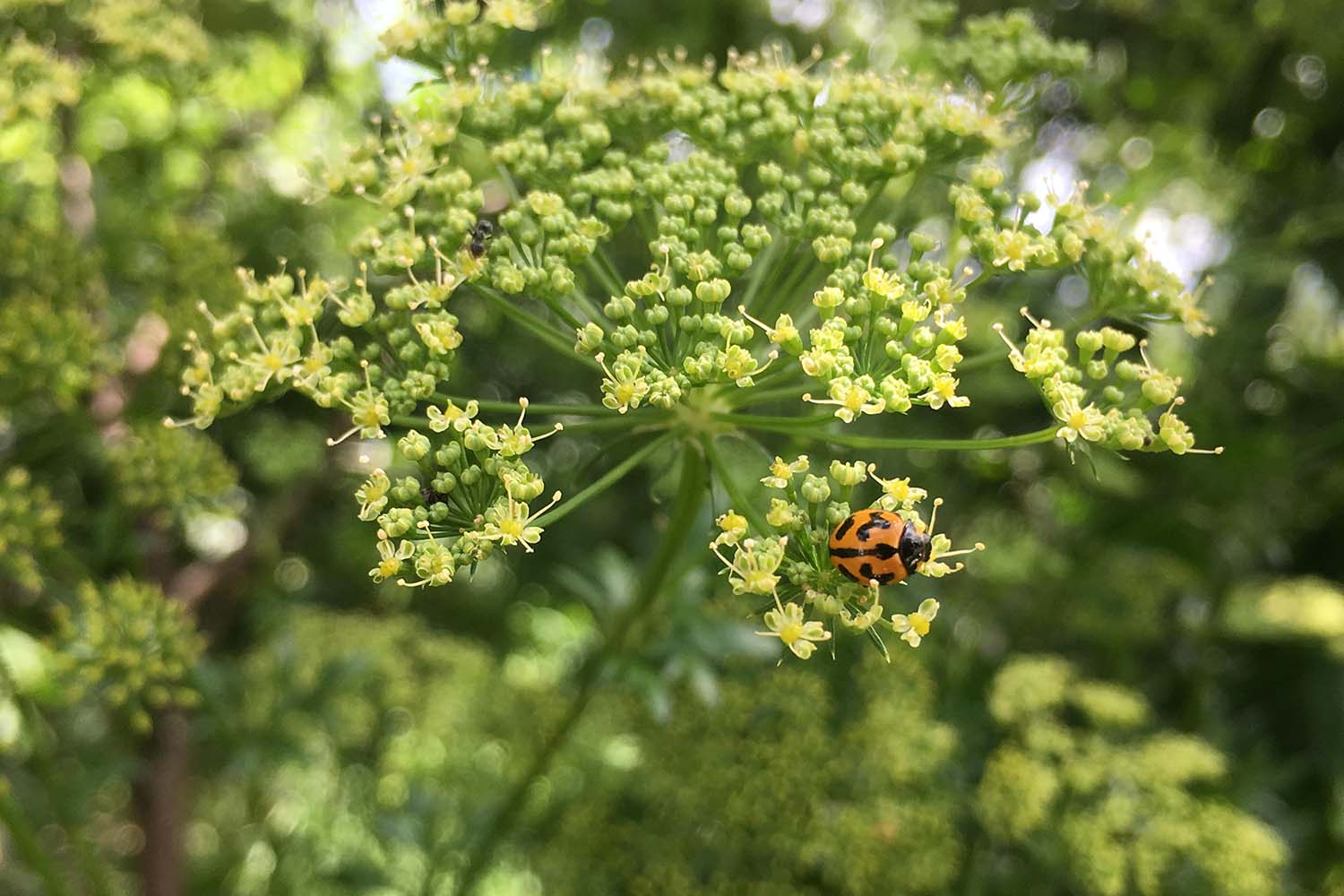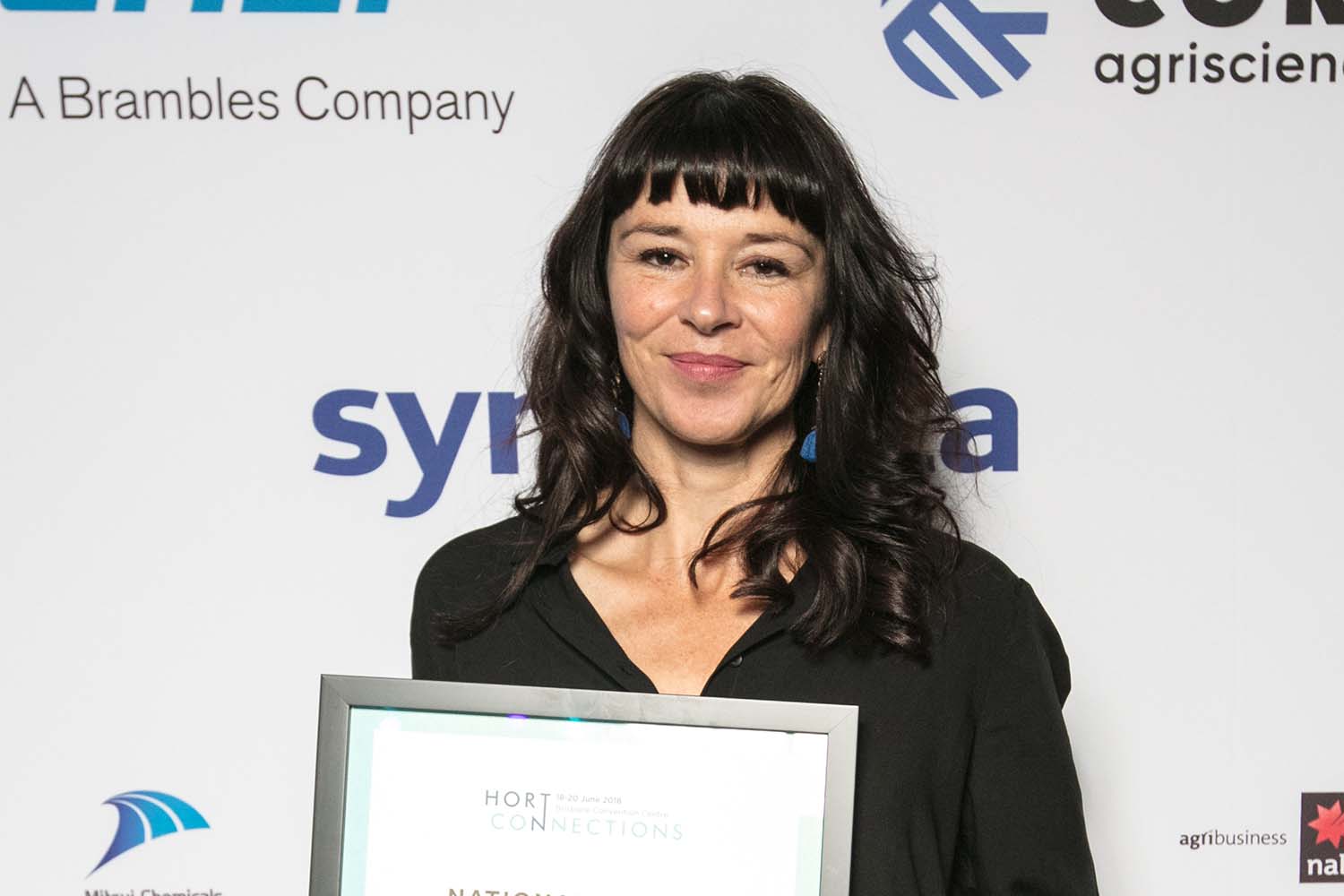Jessica Page’s research proves beneficial to horticulture
A long and successful career as an entomologist for IPM Technologies has led Jessica Page all around the world, from Europe to south-east Asia and New Zealand, to work on Integrated Pest Management practices. Jessica’s research and commitment to horticulture was celebrated at Hort Connections 2018 when she took home the Researcher of the Year award.
Fast facts
Name: Jessica Page
Location: Hurstbridge, VIC
Works: IPM Technologies
Role: Entomologist
As an entomologist with IPM Technologies, Jessica Page has spent over 20 years working closely with potato and vegetable growers to reduce their insecticide use and improve control of insect pests by using Integrated Pest Management (IPM) practices.
Entomologists specialise in insects and other invertebrates (animals that don’t possess a skeleton of bone, either internal or external). Jessica’s role is to give advice to clients such as growers and remind them that not all insects are bad for their crops.
Throughout the two decades with IPM Technologies, Jessica has worked with a wide variety of crops including potatoes, onions, shallots and other vegetables (celery, lettuce, brassicas); strawberries; flowers; broadacre crops (wheat, barley, canola); pasture; and tree crops. Her research has incorporated both field and extension activities.
Jessica’s dedication to the horticulture industry and her enthusiasm for working with growers was recognised at the Hort Connections 2018 National Awards for Excellence Gala Dinner on 20 June, where she received the Researcher of the Year award sponsored by Bayer.

Insect focus
Jessica’s journey into the horticulture industry began when she joined the Victorian Department of Primary Industries (DPI) as a laboratory technician after completing university. This led to her working at an insectary, a place where insects are kept, exhibited and studied. In 1996, Dr Paul Horne (who was also working with Jessica at the DPI) established IPM Technologies and Jessica joined his team. And the rest, as they say, is history.
Fast forward to 2018, and Jessica has worked on various projects in both the potato and vegetable industries, and co-authored two books published by CSIRO Publishing – Controlling invertebrate pests in agriculture and Integrated Pest Management for crops and pastures.
There are three components to IPM: biological control, cultural control and chemical control. The program is focused on integrating the three approaches to create a strategy that is sustainable.
“All of our research is about helping growers control pests and developing IPM strategies. We apply the same approach to every crop type that we work in;,” Jessica says.
“Alongside that, we do a lot of pesticide testing on beneficial insects. We apply that research directly to the extension activities.
“For the potato industry, it’s beneficial because it’s a better control of pests, a reduction in insecticides and prepares growers for the arrival of new pests such as the tomato potato psyllid (TPP).”
Currently IPM Technologies is delivering a national potato and onion IPM extension project. This five-year program offers hands-on, practical training for potato and onion growers and agronomists in all major production regions around Australia.
An IPM extension program for the potato and onion industries (MT16009) is a strategic levy investment under the Hort Innovation Onion, Fresh Potato and Potato Processing Funds.
"When I go to La Trobe University, it seems that half of the agriculture/science students are female. I think we need to encourage them to stay in the industry and I suppose a big part of that would be making sure that there are rewarding career opportunities, before and after they have children."
Collaboration is key
Jessica’s work has enabled her to travel around the world with IPM Technologies. She has worked in Denmark and Sweden, Switzerland, south-east Asia and New Zealand to visit researchers and collaborate in the IPM space.
“I think collaboration is always very valuable but I think what we’ve learnt is that Australia is leading the way in many aspects of IPM,” Jessica says.
“IPM in Australia is as well-developed as it is elsewhere. Also, the issues that farmers face here and their concerns about making practice changes are the same regardless of where they are in the world.”
The TPP incursion in New Zealand and Western Australia is a strong example of how we can work with and learn from our overseas counterparts. In 2009, IPM Technologies visited New Zealand to help to develop an IPM strategy to growers following the detection of the psyllid. Now, the lessons learnt from our trans-Tasman neighbours while using these practices can be applied to Western Australian growers who are currently managing TPP.
“When it comes to dealing with a specific pest or a pest that we don’t have here, there is a lot we can learn. Working with researchers who are willing to share their knowledge is really important, and the researchers we met in Switzerland, Sweden, Denmark, south-east Asia and New Zealand were all very open.”
Jessica says that her horticultural knowledge has developed from her experience working at IPM Technologies over the past 20 years, particularly in the field.
“We have always placed an emphasis on working collaboratively with growers and that’s been really fundamental to everything that we do. We learn as much from the growers that we work with as they do from us,” she says.
There has been positive feedback from growers as a result of working with IPM Technologies – and the rewards are two-fold.
“Some of the most rewarding parts of the job are working with individuals and small farms, and helping them make changes on the small-scale projects that we do (not just the big national ones),” Jessica says.

Women in horticulture
As a female who has spent over two decades in the horticulture industry, Jessica says that women don’t necessarily need to be encouraged to enter the sector.
“When I go to La Trobe University, it seems that half of the agriculture/science students are female. I think we need to encourage them to stay in the industry and I suppose a big part of that would be making sure that there are rewarding career opportunities, before and after they have children – so supporting them when they come back to work,” Jessica says.
“I think it’s also really important that there are more women in leadership roles, and that they’re visible so that young women can see that there are long-term career options. It’s also often hard for women to be visible sometimes.”
Women have certainly shared the limelight at IPM Technologies, with Jessica’s colleague Angelica Cameron receiving the Researcher of the Year award (sponsored by SA Water) at the 2018 AUSVEG SA and William Buck Vegetable Industry Awards for Excellence in April. Angelica was also nominated for the national award.
Jessica says winning these awards is a great endorsement for the company.
“It means that we’re on the right track, and that what we’ve been doing is relevant and is being appreciated,” she says.
“My proudest achievement is working for IPM Technologies and what our company as a whole has achieved. That’s making practice change, helping growers and being able to reduce pesticide use.
“I’m really proud to have received the Researcher of the Year award. I’d also really like to mention as a company, we are proud that Angelica won the award in South Australia. She has a long and very successful career ahead of her.”
This grower profile first appeared in the leading magazine for the Australian potato industry, Potatoes Australia. If you’d like to subscribe to receive a new edition of Potatoes Australia in your mailbox every two months, use our online subscription form!
Photo credit: asbCreative

